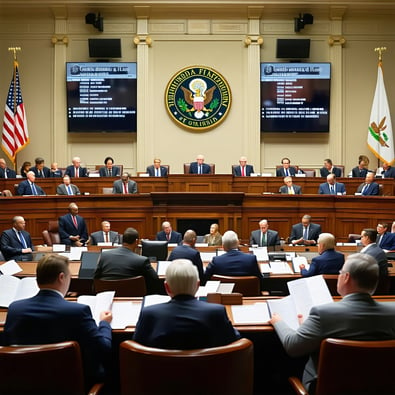Key Points:
-
Approved law restricts marijuana advertising in public spaces
-
Any symbols or characters that might entice people under 21 years old will be banned
-
Law does not go into effect until June 2026
First, they came for Joe Camel.
Now, Arizona lawmakers are targeting Santa Claus.
No, they’re not trying to erase him. But they don’t want his image being used to pitch the sale of marijuana any more than the R.J. Reynolds mascot was used to promote smoking.
A new law approved by a wide margin and signed by Gov. Katie Hobbs will curb how those state-regulated marijuana establishments can promote their products. The key, according to Rep. Selina Bliss, is to stop promoting the drug, which is legal for adults, to anyone younger than 21.
That, said the Prescott Republican, means ensuring none of the advertising is targeted at those in that age group.
That means no images or likenesses of toys, cartoons, “or animated or fictional characters, including Santa Claus,” in marijuana advertising.
Also off limits are names on products that resemble or imitate food or drink brands marketed to children. It also bans any sort of advertising in any medium that targets young viewers.
However, even when the advertiser claims to target adults, there are additional restrictions.
Advertising will also be banned at public airports, public buses and trains, including the shelters set up at stops.
Even general advertising on websites will have special restrictions: It can exist — but only if 73.6% of the audience is expected to be at least 21 years old.
That figure is not random.
Bliss said it is based on census population data of the U.S. population that is at least 21 years old. More to the point, Bliss said that’s the standard set by the Distilled Spirits Council of the United States for determining whether advertising is targeted at adults or children.
That same figure also appears elsewhere in the new law: It bars marijuana retailers from sponsoring any sporting event unless at least 73.6% of the audience is expected to be at least 21 years old.
Also outlawed will be billboards within 1,000 feet of any child care center, church, substance abuse recovery facility, public park or playground, or any public or private school that teaches children through the 12th grade.
“At the end of the day, this is about protecting our children,” Bliss told colleagues. And she said this isn’t just an academic issue to her.
During House testimony on the bill, Gary Kirkilas, a Phoenix pediatrician, said the proposal is not any different than when the Federal Trade Commission cracked down on tobacco advertising meant to entice children to smoke. Perhaps the most famous of these was the ruling ordering R.J. Reynolds Tobacco Co. to stop using the Joe Camel character.
Now, he told lawmakers, they need to set the same restrictions on the sale of marijuana.
The drug first became legal in Arizona after voters approved a medical marijuana program in 2010, allowing people with certain conditions and a doctor’s recommendation to possess the drug. A decade later, recreational use for those 21 and older became the law.
And with legalization came advertising.
Kirkilas came armed with pictures he had taken himself.
One was a photo from a billboard from a Phoenix area freeway “with a Santa Claus smoking a blunt,” he said.
“This happens every December,” Kirkilas said — and not just by shops selling marijuana. He showed another picture of Santa holding a bong, captioned, “Santa knows where to get the dopiest gifts.”
“Adults can do what they want to do,” Kirkilas said. “But I have absolutely no patience for somebody targeting youth in their advertising.”
It actually took four tries to get lawmakers to approve the restrictions. Prior measures, going back to 2018, all faltered amid varying objections.
That almost happened this time too — with concerns about whether Bliss’ proposal would extend beyond marijuana dealers to those that sell hemp-infused items that have so little of the psychoactive drug as to not qualify as marijuana. Lawmakers agreed to exempt those products from the terms of the legislation.
Still, don’t be surprised if Santa shows up on a billboard this Christmas touting his favorite THC gummies.
Lawmakers did agree to give businesses some time to come into compliance. So, while the measure was approved and signed by the governor, it does not take effect until June 30, 2026.





